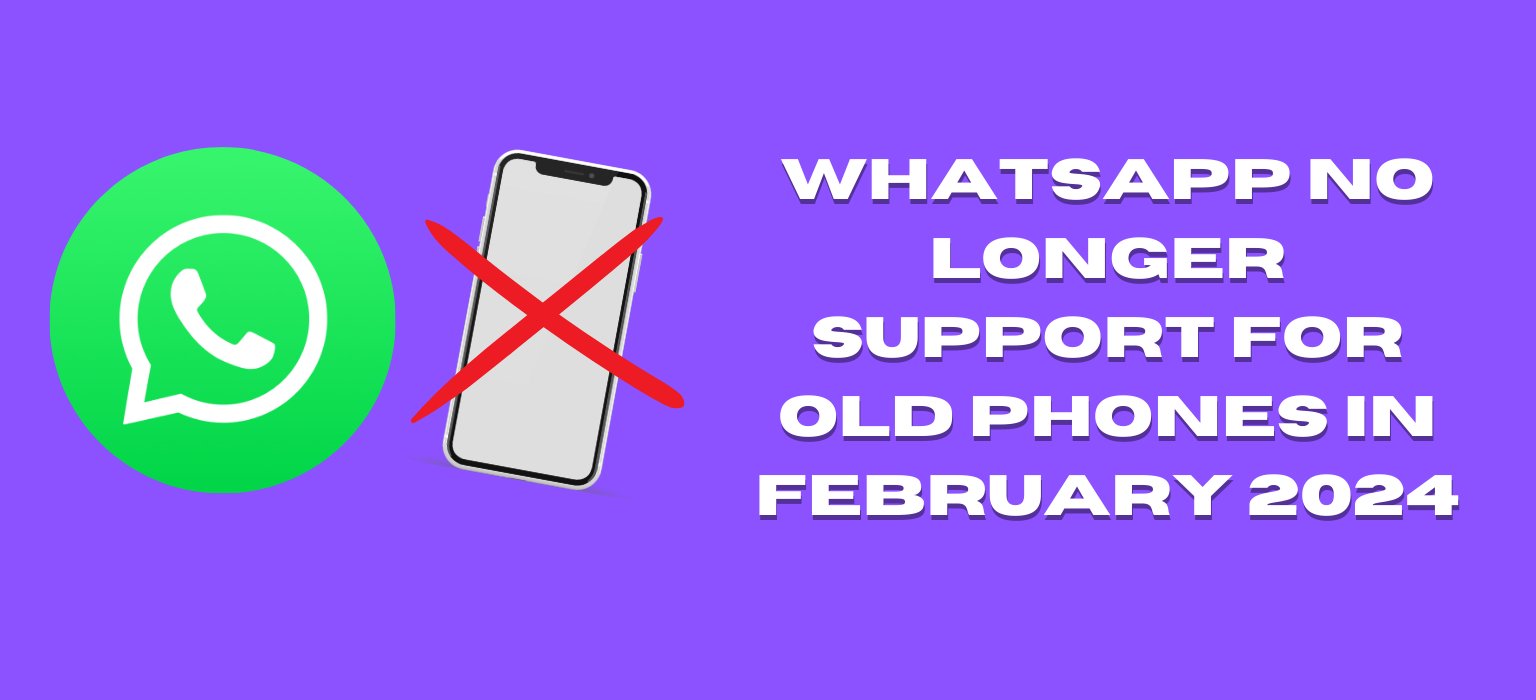
WhatsApp has announced that starting February 2024, the popular messaging platform will end support for a significant number of older Android and iOS smartphones. Devices not capable of upgrading to the latest OS versions will lose access to WhatsApp and the ability to send or receive messages.
This purge of aging devices from WhatsApp compatibility aims to provide users with the latest features and security while maintaining performance quality standards. But it also risks alienating owners of perfectly functional phones who rely on WhatsApp as their main communication tool.
Let’s take a closer look at exactly which phones got the chopping block and what options remain for affected users once support ends.
Why WhatsApp is Dropping Old Phones ?
First, understanding why WhatsApp initiated this wave of device exclusions helps provide context around the disruptive but necessary move.
The main factors behind WhatsApp’s decision include:
- Enabling new features – New capabilities rely on faster processors only available in latest OS versions
- Security – Older phones missing latest encryption and protections could compromise all users
- Performance – Eliminating laggy devices maintains app speed and reliability
- Simplification – Reduces software complexity supporting ancient phones dating back over a decade
WhatsApp cites how new additions like dissapearing messages, Communities, and large file sharing demand capabilities only present in the latest Android and iOS versions.
Continuing to support iPhone 6-era processors or Android 4.1 would necessitate ugly app fragmentation. This path quickly snowballs into a maintenance nightmare plagued by bugs and security holes.
So by ruthlessly culling the compatible device list, WhatsApp puts itself in the best position to keep enhancing how over 2 billion users communicate worldwide.
Full List of Phones Losing WhatsApp Support
Now to the bad news millions of owners of older or budget Android phones and iPhones face – the complete list of devices losing WhatsApp support for good come February 2024:
Android Phones
- LG Optimus F3, F3Q, F5, F6, F7, L2 II, L3 II, L3 II Dual, L4 II, L5 II, L7 II
- Huawei Ascend D2, G740, Mate
- Sony Xperia M
- ZTE Grand S Flex, V956, UMi X2
- Samsung Galaxy Ace 2, Core, S3 Mini, Trend II, Trend Lite
- Various Archos, Assistant, Cherry Mobile, Wiko Models
iPhones
- iPhone 6S
- iPhone 6S Plus
- iPhone SE (1st Gen)
Any Android phone without at least Android 5.0 (Lollipop) or any iPhone earlier than the 7 will also gets the chopping block.
Note this list is still being finalized by WhatsApp so expect a few last minute entries or subtractions. But vast majority of the older budget devices above look certain to get cut off for good.
WhatsApp Alternatives For Users of Old Phones
Losing WhatsApp functionality serves as a major blow for people still holding onto phones from 2015 or earlier out of necessity or nostalgia.
Without access to WhatsApp, their alternatives include:
1. Upgrade Their Phone
- The most obvious but potentially expensive or impractical option
- Limited cheap new phone choices today meet WhatsApp’s minimum specs
- Contracts and monthly costs burden lower income demographics most affected
2. Use WhatsApp Web
- Access WhatsApp messages and account via WhatsApp Web browser interface
- Requires syncing to a supported mobile device whenever logging in
- Infeasible as permanent replacement but fine for temporary access
3. Switch Messaging Apps
- Migrate conversations and contacts to apps still supporting older OSs
- Telegram, Signal and old favorites like SMS remain options
- Network effects key to messaging make migration tricky if circles still WhatsApp-centric
4. Use Unsupported Modified Versions
- “Modded” APKs exist bypassing OS limits but violate WhatsApp Terms
- Lack of official support and potential for bans makes this very risky
- Security dangers amplify with outdated Android versions susceptible to malware
As usual, economics often overrule practical technology concerns for many. But outdated devices represent genuine cyber attack vectors threatening all users when lingering too long without patches.
Final Words
This WhatsApp abandonment of loyal users on extremely tight budgets or aversion to planned hardware obsolesence leaves a sour taste for such an essential communications platform.
And it begets philosophical debates around support policies reflecting software complexity rather than serving disadvantaged groups most dependent on connectivity.
But the reality remains that even open, free platforms ultimately answer to pragmatism. Maintaining quality and security at monumental scale demands uncompromising standards.
For affected individuals suddenly severed from friends and family via WhatsApp, it poses an unexpected test of priorities and access. Ideally recycling programs could offset costs for economically challenged owners to upgrade.
Governments and advocacy groups may consider subsidized technology budgets allowing their most vulnerable constituents to cross unavoidable upgrades like this less painfully.
Because connectivity remains an undisputed lifeline preventing groups from slipping further through cracks in society. And the collateral damage by withdrawing access risks amplifying inequality gaps when only money governs technology access dividing the haves from have nots.
The improvements coming to WhatsApp only emerge by first abandoning users unable to smoothly transition across arbitrary mobile generational leaps. This unavoidable divide demands empathy on both sides along with creative solutions affirming connectedness as a universal right.
Before proclaiming technical disenfranchisement an inevitability, companies like WhatsApp together with policy makers should explore accommodations upholding more than just the bottom line. Only supporting those already ahead risks losing sight of social responsibilities binding us all.
Read More :-
- Should You Subscribe to ChatGPT Plus in 2024? Examining the Pros and Cons
- Smart TV New Trick to Install Apps That Not in Official Stores
- This iPhone trick lets you read WhatsApp messages in secret
- VF Corporation Faces Enormous Data Breach Impacting Over 35 Million Customers
- TPM in 2024: Why Your PC Absolutely Needs It for Enhanced Security